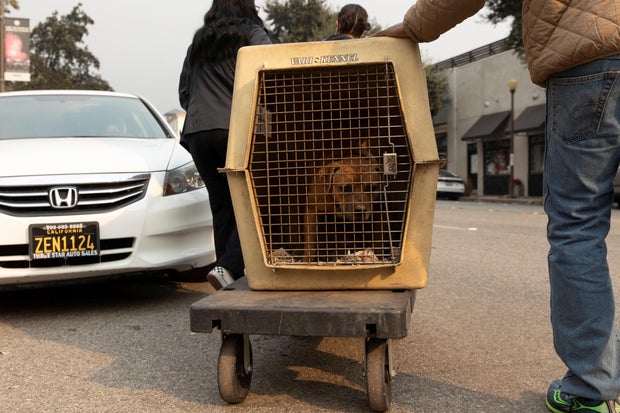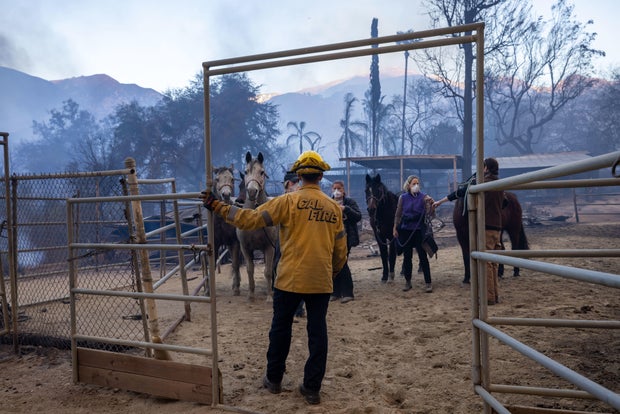The recent wildfires in Los Angeles have cast a shadow over the city, leaving destruction in their wake. These wildfires, fierce and uncontrollable, have not only affected homes and communities but also displaced countless animals—both domestic pets and wild creatures. In the chaos of evacuation and destruction, it’s crucial to recognize the needs of these vulnerable animals and lend a helping hand where possible.
The Devastating Impact of Wildfires on Animals in LA
Every year, wildfires ravage parts of California, with Los Angeles being one of the hardest-hit areas. In 2024, a series of powerful wildfires swept through the region, engulfing neighborhoods and pushing wildlife from their natural habitats. This disaster left many animals, both domestic and wild, stranded and in need of immediate support. Pets that were left behind in evacuations, or those separated from their owners, faced an uncertain future.
As the fires spread, it became apparent that the situation for animals was dire. Domestic pets, primarily dogs and cats, found themselves in shelters or wandering in panic, while wildlife such as deer, foxes, and birds fled to urban areas for safety. These animals, already stressed from the flames, faced further challenges—whether it was finding food, water, or shelter amidst the devastation.

Petcare Tips for Evacuations and Emergencies
During wildfires, the safety of pets must be prioritized. As authorities urge residents to evacuate, there are essential steps pet owners can take to ensure their furry companions are protected:
1. Create an Emergency Kit:
A pet emergency kit should include food, water, medications, leashes, waste bags, and necessary documents like vaccination records. It’s always best to prepare in advance, as this can save precious time during an emergency evacuation.
2. Evacuation Plans for Pets:
Many families evacuate with their pets, but some forget to make adequate arrangements for their animals in the rush to leave. Always plan for pet-friendly evacuation routes and shelter options.
3. Identification Tags:
In chaotic situations, pets may become lost or separated from their owners. Ensure your pets wear identification tags and microchips for easy identification. This will significantly improve the chances of being reunited with your pet.
4. Stay Calm and Protect Your Pets:
Pets are often affected by their owner’s anxiety. Remaining calm can help pets feel safer. If it’s safe, bring pets indoors and close windows and doors to prevent smoke from entering.
5. Keep Pets Indoors When Possible:
Wildfires can cause air quality to worsen rapidly. Keeping pets indoors will protect them from harmful smoke and ash, which can cause respiratory problems.

Supporting Wild Animals Affected by Wildfires
While pets are often the focus of evacuation efforts, wildlife also requires urgent attention. Many animals are forced to leave their habitats, seeking shelter in urban areas or unfamiliar environments. In addition to rescuing pets, it’s equally important to look out for injured or displaced wildlife during a wildfire.
1. Provide Safe Shelter:
If you see wild animals in distress, offer shelter in a safe, quiet area. Be sure to keep your distance to avoid stressing them further, but provide food and water where possible.
2. Report Injured Wildlife:
In cases of injured wildlife, don’t attempt to handle the animal. Contact local wildlife rescue organizations that are equipped to help with these situations. They have the necessary resources and expertise to care for wild animals.
3. Support Wildlife Rescue Groups:
Donating to wildlife organizations can help provide care for displaced and injured animals. Many groups, such as the California Wildlife Center, offer rescue and rehabilitation efforts for wildlife impacted by natural disasters.

How You Can Help Animals Affected by Wildfires
You may be wondering how you can support both homeless and wild animals during such a devastating time. Here are a few ways you can make a difference:
- Donate to Animal Shelters:
Many local shelters are overwhelmed by the influx of animals in need. Donations of food, supplies, and funds will help these organizations provide essential care for displaced animals.
- Volunteer at Local Shelters:
If you’re able to, volunteering at shelters can provide hands-on help in caring for animals. Many shelters rely on volunteers to help manage the increased demand during emergencies.
- Foster Pets:
Consider fostering pets who have been displaced by the wildfires. By offering a temporary home, you provide a safe and loving environment until they can be reunited with their families or find permanent homes.
- Spread Awareness:
Use social media to share information about lost and found pets, local shelters in need of donations, or wildlife rescue efforts. Raising awareness about the situation can encourage others to get involved.

Conclusion: Lending a Helping Hand for Pets and Wildlife in LA
The aftermath of the recent wildfires in Los Angeles serves as a reminder of the importance of helping animals in times of crisis. Whether it's offering shelter to displaced wildlife or providing food and medical care to pets in need, every act of kindness counts. By staying prepared, supporting rescue organizations, and taking action in your community, we can make a meaningful difference in the lives of these vulnerable creatures.
TalkyTails, a pet-helping blogging website, is committed to providing tips, resources, and advice for pet care during emergencies. Visit our website for more information on how to keep your pets safe and healthy during wildfires and other natural disasters.



